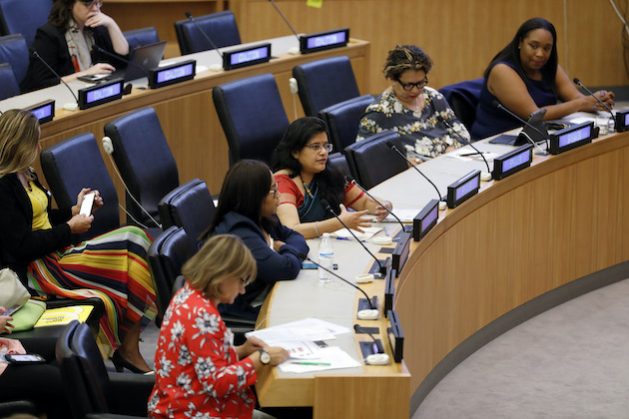
Toronto, Could 27 (IPS) – Whereas the local weather disaster impacts just about each side of life, its impacts should not felt equally.
An individual’s vulnerability to local weather change varies relying on their place in society, comparable to socioeconomic standing, dependence on pure assets, and capability to reply to pure hazards. Since completely different genders typically expertise completely different social standings, gender has emerged as a key element to consider for efficient local weather planning and adaptation.
Angie Dazé, Gender Equality and Social Inclusion lead on the Worldwide Institute of Sustainable Growth (IISD), says social norms linked to gender of their communities and households affect folks’s completely different roles.
“Gender influences how folks expertise the impacts of local weather change, and it additionally influences their capability to reply,” Dazé advised IPS in an interview. “As a result of folks play completely different roles, they’re in another way impacted by the identical results of local weather change.”
Whereas local weather change experiences are context-specific and assorted, a growing body of research suggests that girls are extra susceptible to the impacts of local weather change. The higher poverty level and decrease socioeconomic energy make recovery from natural disasters more difficult for girls. UN figures additionally present that girls and women make up 80 percent of those displaced by local weather change.
“Gender inequalities create boundaries that may exacerbate folks’s vulnerability to local weather change. And this most frequently impacts girls and women,” Dazé stated.
As a result of social teams expertise local weather change in another way, gender has change into more central to the United Nations (UN) local weather course of and the worldwide discourse round local weather motion.
Goal 13.b of the UN Sustainable Growth Objective (SDG) on climate actionrecognizes the gender-environment nexus. It states that specializing in girls is essential for rising local weather change planning and administration capability.
Key frameworks encouraging the combination of gender issues for local weather motion, such because the enhanced Lima Work Programme on Gender and its Gender Action Plan, have additionally been established at current UN Local weather Change Conferences. Agreed upon at COP 25 in 2019, these frameworks promote gender mainstreaming for the events and the combination of gender issues all through the UN Framework Conference on Local weather Change (UNFCCC) work and processes.
Nonetheless, gender illustration stays restricted in local weather decision-making areas, and issues of gender in nationwide coverage are inconsistent.
Regardless of males being simply over half of the registered authorities delegates at UNFCCC plenary conferences from Could to June 2021, according to a UNFCCC analysis, they spoke for 74 % of the time. Attendance at COP gender-related occasions is also low.
On the nationwide stage, only 15 percent of environmental ministries are headed by girls, and only a third of nationwide vitality frameworks include issues of gender. A study from the Worldwide Union for Conservation of Nature (IUCN) of 89 nationally decided contributions revealed that just about 1 / 4 don’t have any references to gender.
Pointing to the hurt of gender-blind approaches to local weather coverage, Christina Kwauk, a gender, training, and local weather change specialist, advised IPS, “the insurance policies that we create might have unintended penalties that perpetuate constructions of discrimination or inequality, or gender norms and dangerous gender-based practices.
“Present insurance policies or options or actions might exacerbate time poverty for girls or exclude entry to girls. Perhaps girls won’t have as a lot entry to those completely different options due to present gender norms.”
Kwauk credit the progress towards gender mainstreaming as important however believes it has not reached the tempo wanted to see a big influence.
Present gender-responsive local weather insurance policies, Kwauk defined, “are all pointing in the appropriate route. However the underlying techniques of inequality and the underlying constructions of inequality stay. And so long as these points are nonetheless there, the coverage, the discourse, these are good strikes in the appropriate route, however they’re not sufficient. They’re not altering precise lived experiences the social norms, and the social boundaries to participation.”
As an eco-feminist and local weather change activist engaged on land entry for girls, Adenike Oladosu is accustomed to the intersections of gender and the setting. In an interview with IPS, she confused the necessity for international locations to combine gender all through varied sectors higher and—pointing to her house nation of Nigeria—the necessity for governments to legalize and implement their gender motion plan all through all sectors.
Oladosu believes that this motion is paramount to bettering the illustration of girls in international fora.
“After we see that gender is essential in several sectors, it improves the illustration of girls in conferences as a result of we’re capable of execute each motion we soak up a gender-sensitive method,” Oladosu stated. “All of it has to begin from particular person international locations, attempting to enhance gender sensitivity of their boundaries, or attempting to combine gender-sensitive approaches of their varied sectors.”
Empowering girls can even assist create new options to mitigate the local weather disaster. Drawing upon her advocacy work, Oladosu emphasised that tapping into girls’s indigenous data as caretakers of the land and facilitating land entry for girls results in new options for mitigating the local weather disaster.
UN knowledge exhibits that when girls are supplied with the identical assets as males, they will increase agricultural yields by 20-30%, decreasing starvation.
Total, gender is essential to contemplate—and girls are paramount to contain—for a simply and equitable battle in opposition to local weather change.
“Girls make up half of the inhabitants of the world,” Oladosu stated. “So, should you take them away or depart them behind in fixing the defining concern of our time, it positively goes to have an effect on the options which can be introduced up, or by now, we might have achieved local weather justice.”
IPS UN Bureau Report
Follow @IPSNewsUNBureau
Follow IPS News UN Bureau on Instagram
© Inter Press Service (2022) — All Rights ReservedOriginal source: Inter Press Service





